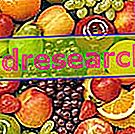«Bad digestion and dyspepsia
Dissociated diet against digestive problems
At this point we must inevitably introduce the principles underlying the dissociated diet and its variants. In reality, rather than real diets, these are fashions that, due to countless errors of evaluation, have not found a wide consensus among doctors and professionals in the sector.
Also to illustrate this principle we can use the comparison with a person's work.

For the same reason, a single binge complete with first course, fruit, dessert and coffee would cause many problems to our digestive system. However, fortunately, some workers have a good mental flexibility that allows them to successfully jump from one problem to another. Likewise, within a certain limit, even our body manages to extricate itself from the digestion of different kinds of food.
The composition of the meal in terms of macronutrients is in fact important as the various foods we eat require contrasting or even opposite digestive processes. By studying these associations, a list of unfavorable food combinations was drawn up, whose simultaneous digestion creates some problems for the body.
Proteins and Carbohydrates
The digestive enzymes involved in the digestion of these two classes of nutrients compete with each other. In fact, proteins need an acidic environment to be digested while carbohydrates need a basic environment. Protein intake along with carbohydrates therefore causes both to stop digesting, as carbohydrates, forced to stay longer than necessary in the stomach, give rise to putrefaction processes.
The more carbohydrates are simple or with a high glycemic index (sugar, sugary fruit, sweets, honey etc.) and the greater the digestive problems.
Acids and Carbohydrates
Acidic foods and beverages (wine, beer, vinegar, sour fruit, fruit juices and some sugary drinks) tend to lower the gastric pH, hindering the digestion of carbohydrates. These foods are instead indicated to favor the digestion of a protein meal since, as we have already seen, proteins are better digested in an acid environment.
Fats and Proteins
Above all, cooked fats tend to slow down the digestion time of proteins in the intestine, giving rise to putrefactive processes that can only be balanced by the simultaneous intake of raw vegetables.
FRUIT: we can divide this food category into two large groups: the acidulous fruit (lemons, melons, apricots, oranges, apples, cherries) and sugary fruit (persimmons, grapes, figs, dates, chestnuts). Since the former increases gastric acidity by counteracting the digestion of the sugars present in the latter, it would be good to never associate these two types of fruit with each other.
SEE ALSO: Correct food combinations DISS apart
The scrupulous observance of these rules inevitably leads to an impoverishment of the diet, both in terms of quality and quantity. While it is true that the Italian diet is full of incongruous food associations, on the other it is also true that often the caloric limit proves to be far more important than the correct combination of foods.
- Those who eat badly and are overweight are more likely to suffer from digestive problems than a normal person who follows a balanced diet. It is therefore necessary to follow some important rules in the diet field such as the reduction of fats (especially saturated fats) in favor of fibers, vitamins and antioxidants of which raw fruits and vegetables are particularly rich. The fish compared to meat, in addition to having a better lipid profile, is less rich in connective tissue, therefore more easily digestible.
- It is not enough to eat better, we must strive to eat several times a day and in addition to the three main meals (breakfast, lunch and dinner), if necessary, insert a snack mid-morning and afternoon.
Poor food quality
Today on our tables you can find foods from anywhere in the world at affordable prices.
Unfortunately in many cases the quality of food does not go hand in hand with the economic possibilities of the consumer nor with his dietary knowledge. On the other hand, the food industry, like other commercial activities, is certainly not immune to gain ambitions and this most often goes to the detriment of the quality of their products.
Often we need baffling news like anabolic in meat, mercury in fish or dioxin in chickens to momentarily awaken the consumer's critical spirit. In reality it would be enough to know the real properties of chemical additives or other substances used in the food industry to stay away from many of the many products existing on the market.
If these substances taken individually in limited doses are completely harmless, the same thing cannot be said if their consumption lasts a long time or if they are consumed for years adding them to other chemical additives.
Frying food develops, for example, numerous toxic substances, depending on the type of oil used and the cooking temperature. A kilo of grilled meat instead contains roughly the same amount of benzopyrene (a highly carcinogenic hydrocarbon) present in 600 cigarettes.
The combination of toxic substances, chemical additives and poor quality food inevitably leads to an intoxication of the organism whose easily observable symptoms include dermatitis, increased body weight, fatigue, headache and digestive problems. The regular consumption of fruit and vegetables combined with a little physical activity helps instead to reduce the absorption of these substances while promoting their elimination.
SOME RECOMMENDED FOODS TO ENCOURAGE DIGESTION: Artichoke, cabbage, bran, fennel, lemon balm, mint (contraindicated in the case of gastroesophageal reflux), and gentian.



